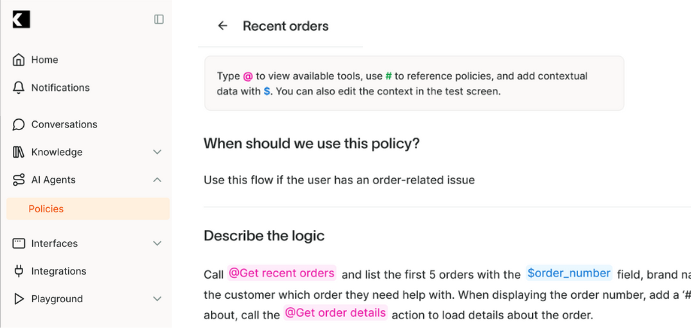Ingredients
ShipMonk, Freshdesk, and Kodif.
What are AI Policies?

At Kodif, we’re excited to announce the launch of Policies—a powerful, dynamic solution designed to revolutionize the way CX managers handle customer support. Unlike traditional flows, which are rigid and complex, Policies empower non-technical users to create and manage customer interactions with ease. Written in natural language, Policies make it simple to define and refine customer experiences without needing to rely on complicated flowcharts or scripting. This approach is not only user-friendly but also self-serve, enabling CX teams to quickly translate existing Standard Operating Procedures (SOPs) into automation, saving valuable time and resources.
The flexibility of Kodif Policies ensures that businesses can offer personalized, context-driven support while continuously improving customer experiences. With Policies, you can experiment with different strategies to optimize outcomes such as CSAT, revenue, and retention—all without the need to rebuild complex workflows. Whether it’s automating routine interactions or testing new approaches for high-stakes scenarios, Policies provide a scalable, adaptable solution that aligns with your business goals. While flows still have their place in sensitive, high-risk situations, Policies offer an agile alternative that helps businesses innovate faster and deliver exceptional, tailored experiences at scale.
“WISMO” Ticket Type Explained
In the realm of customer support, “WISMO” stands for “Where Is My Order?” It is a prevalent type of inquiry in e-commerce, where customers reach out to support teams to get updates on the status or location of their orders. Handling WISMO tickets efficiently is crucial for maintaining customer satisfaction, as these inquiries often reflect a customer’s eagerness and concern regarding their purchase. Providing timely and accurate responses to WISMO inquiries can enhance trust and improve the overall customer experience by alleviating anxiety around pending deliveries.
Which Platforms Does This AI Policy Work On?
This AI policy is designed to work seamlessly on ShipMonk, Freshdesk, and Kodif. Moreover, Kodif integrates with all other major platforms, ensuring a versatile solution for businesses looking to streamline their customer support operations.
When Should I Use This Policy?
This policy should be employed whenever customers inquire about the status of their orders, a common occurrence in the e-commerce industry. The logic behind this policy involves leveraging available tools and contextual data to automate the resolution of these inquiries efficiently.
-
Ask for the User’s Email Address
a. Use @get_freshdesk_account_details to check if the user with that email address exists in Freshdesk.
b. If the email address is not found, request a valid email address.
c. If the email address is still not found, route the inquiry to an agent for further investigation. -
Display Recent Orders:
a. Use @get_shipmonk_orders to retrieve the user’s recent orders.
b. Display the list of recent orders and ask the user which specific order they would like to inquire about.
c. If the order is not found, route the inquiry to an agent for further investigation. -
Check Order Status:
a. For the selected order, retrieve the shipping status using @shipmonk_order_details(order_id: str).
b. If “Approved”, inform the customer that the order was approved and is awaiting processing.
c. If “Processing”, inform the customer that the order is being processed and is awaiting shipment.
d. If “Pending Shipment”, inform the customer that the order is pending shipment and provide the estimated shipment date.
e. If “Shipped”, inform the customer that the order has been shipped and provide the tracking number.
f. If “In Transit”, use @shipmonk_order_details to check if the order is within the estimated delivery date. If yes, inform the customer of the expected delivery date. If no, inform the customer of a delay and escalate to an agent for investigation.
g. If “Delivered”, confirm with the customer whether the order was received.
h. If the order was not delivered, route the inquiry to an agent or create a ticket for further investigation.
i. If “Canceled”, inform the customer that the order was canceled.
Policy Logic
When should we use this policy? Use this policy when customers want to know the status of the orders.
-
Ask for the User’s Email Address
a. Use @get_freshdesk_account_details to verify the user’s email address.
b. If not found, prompt for a valid email.
c. Route to an agent if the email remains unverified. -
Display Recent Orders:
a. Use @get_shipmonk_orders to pull recent orders.
b. Query the customer on which order they need details on.
c. Route to an agent if the order is not located. -
Check Order Status:
a. Retrieve status with @shipmonk_order_details.
b. Communicate status updates based on approval, processing, shipment, and delivery stages.
c. Escalate to human support if discrepancies or delivery issues arise.
Example Policy
-
Ask for the User’s Email Address
a. Use @get_freshdesk_account_details tool to verify email existence.
b. Request a valid email if not found.
c. Escalate to an agent for unresolved email issues. -
Display Recent Orders:
a. Leverage @get_shipmonk_orders for order retrieval.
b. Allow the customer to specify the order of interest.
c. Direct to an agent if details are missing. -
Check Order Status:
a. Use @shipmonk_order_details for status updates.
b. Provide detailed status updates, including tracking numbers and expected delivery dates.
c. Transfer to an agent for unresolved delivery or order issues.


